To say goodbye in Korean is always a good idea to end your conversations with friends or family in Korea.
Do it wrong and you’re going to sound like a broken record.
The most common way to say goodbye in Korean is by using the term 잘가 [jal-ga], but if you want to say “goodbye when someone is leaving” use the hangul word 안녕히 가세요 [an-nyong-hee ga-se-yo] means “please go“.but when you are leaving a place, you’d say 안녕히 계세요 [an-nyong-hee-ge-se-yo].
Here is a list of the 9 ways to say bye in Korean depending on the other person’s age or how well you know them.
- Casual – 잘 가 (Jal-ga)
- Polite – 안녕히 가세요 (annyeonghee gaseyo)
- Formal – 안녕히 가십시오 (annyeonghee gasipshio)
- Casual – 잘 있어 (Jal-isseo)
- Polite – 안녕히 계세요 (annyeonghee geseyo)
- Formal – 안녕히 계십시오 (annyeonghee gesipshio)
- Polite- 가세요 (gaseyo)
- Informal- 안녕 (annyeong)
- 끊을게요 (kkeunh eulgeyo)-bye” in Korean when ending a phone call.
Byes in Korean is easy. The trick is to be able to say it right in any situation.
This complete guide is a must-read. You’ll get over 50 related vocabulary and alternative phrases with real-life examples to help you sound more natural.
Alright world, it’s time to learn the basics.
Table of Contents
HOW TO SAY “GOODBYE” IN Korean?– in 9 correct ways
안녕히 계세요(AnnyeongHi Gyeseyo) is the standard polite way to say goodbye in Korean when you are the one leaving and literally translates to “please stay well.”. On the other hand, 안녕히 가세요 (An nyeong hi ga se yo) is used when you are the one staying. It means “Please go well.”
잘가 [jal-ga] literally translates to “bye (stay well),”. you can use this phrase to greet your friends and people younger than you like children, siblings,
Like saying hello, Here’s how to say bye in Korean in formal, casual, and polite situations
- Casual – 잘 가 (Jal-ga)/잘 있어 (Jal-isseo)/안녕 (annyeong)
- Polite – 안녕히 가세요 (annyeonghee gaseyo)- whren you are leaving
- Polite – 안녕히 계세요 (annyeonghee geseyo)- when somenone is leaving
- Polite- 가세요 (gaseyo)
- Formal – 안녕히 가십시오 (annyeonghee gasipshio)/안녕히 계십시오 (annyeonghee gesipshio)
- Bye” in Korean when ending a phone call.-끊을게요 (kkeunh eulgeyo)
Let’s start with…
Goodbye In Korean Polite |4 common ways to say bye in Korean.
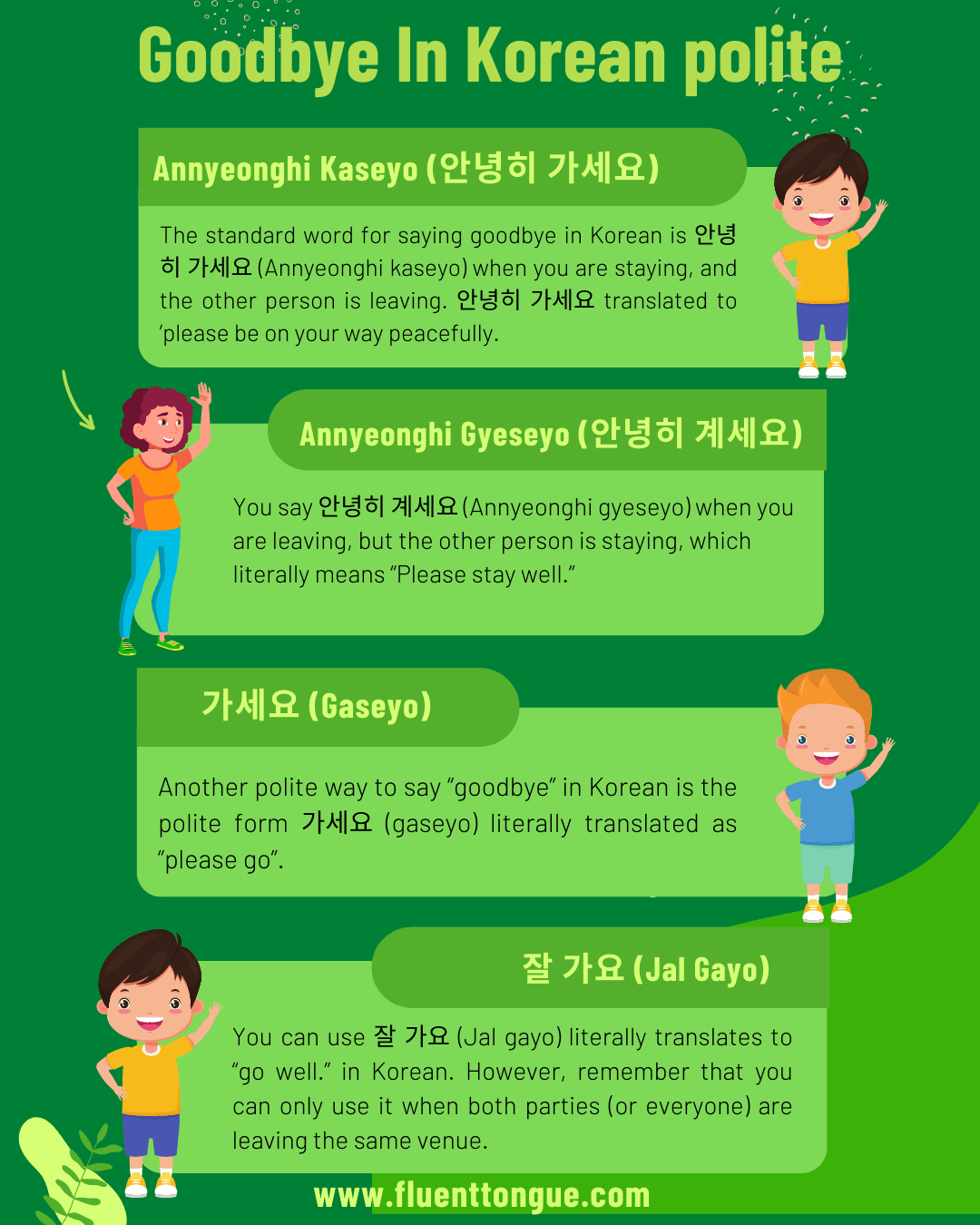
Koreans use different phrases to give farewell depending on whether you are living or staying
Here’s what I mean.
Annyeonghi kaseyo (안녕히 가세요)-how to say goodbye when someone is staying.
The standard word for saying goodbye in Korean is 안녕히 가세요 (Annyeonghi kaseyo) when you are staying, and the other person is leaving. 안녕히 is an adverb that means ‘peacefully or comfortably.
” It comes from the one word, 안녕 means “peace” in Korean by attaching 히. 가세요 is the polite honorific form of 가(go/leave), so it means “Please go.”
So together 안녕히 가세요 translated to ‘please be on your way peacefully.
This phrase is polite. so it’s okay to use this in most situations. There’s another similar phrase you’ll use when you’re the one leaving.
Annyeonghi gyeseyo (안녕히 계세요)-how to say goodbye in Korean when someone is leaving.
You say 안녕히 계세요 (Annyeonghi gyeseyo) when you are leaving, but the other person is staying, which literally means “Please stay well.” 안녕히 is an adverb that means ‘peacefully or comfortably.
계세요 is the honorific form of 있으세요 (isseuseyo), which comes from the verb 있다 (itda, “to exist”).
As you’ve likely figured out by now, 가세요 (gaseyo) and 계세요 (gyeseyo) sound really similar, so Korean learners often mix up these Korean phrases.
But with time and practice, you’ll really get the hang of it.
가세요 (gaseyo) – “Go” in Korean
Another polite way to say “goodbye” in Korean is the polite form 가세요 (gaseyo) literally translated as “please go”. 가세요 (gaseyo) is mostly used by older speakers when they’re saying bye in Korean to younger people.
잘 가요 (Jal gayo)
You can use 잘 가요 (Jal gayo) literally translates to “go well.” in Korean. 잘 means “well” in Korean, and 가요 means “go”.However, remember that you can only use it when both parties (or everyone) are leaving the same venue.
잘 가 (Jal ga) is an informal version of this expression잘 가요 (Jal gayo) which you can use with friends and people younger than you.
Here’s how
GOODBYE IN KOREAN INFORMAL| How to say bye in Korean to friends?
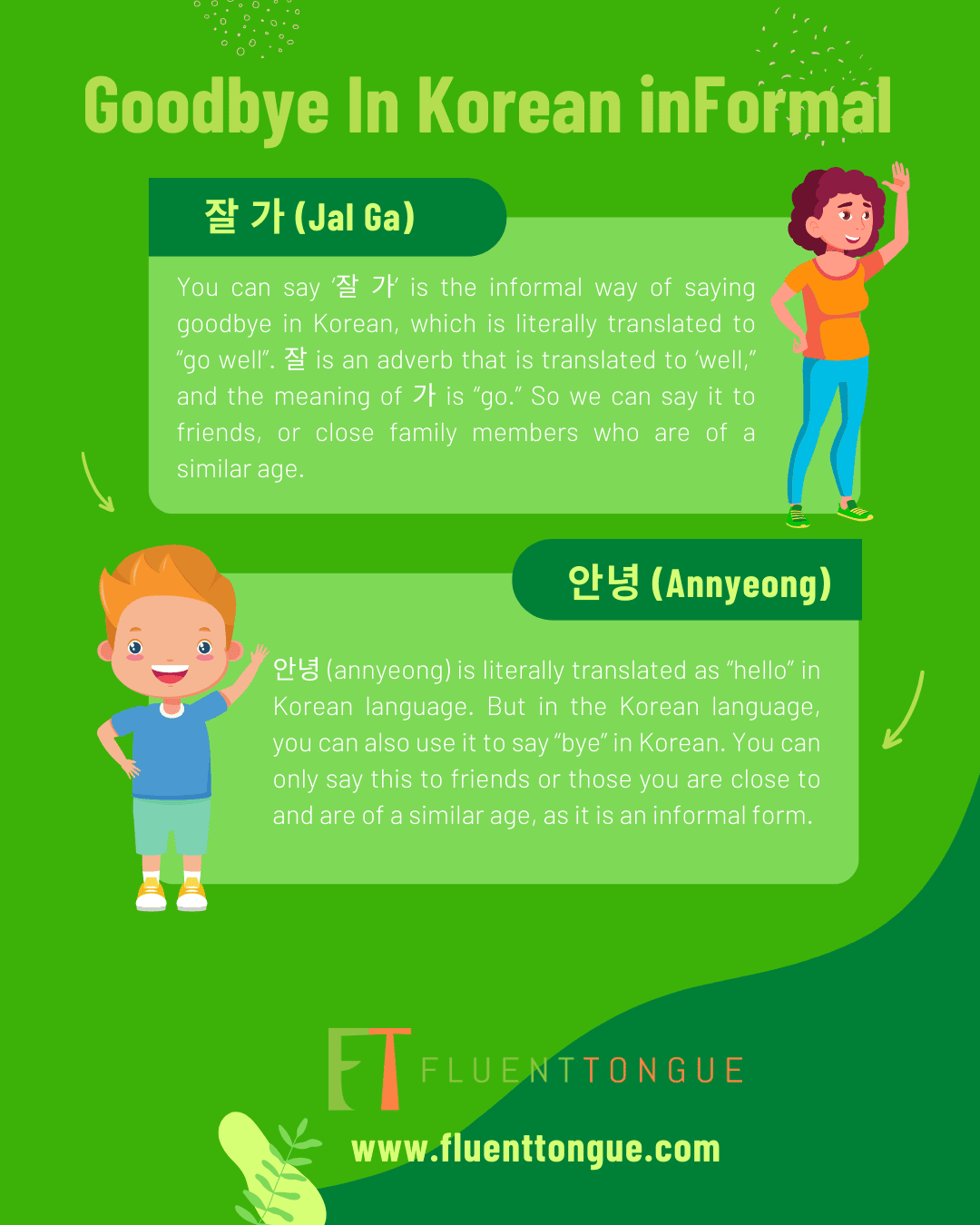
잘 가 (jal ga)
You can say ‘잘 가’ is the informal way of saying goodbye in Korean, which is literally translated to “go well”. 잘 is an adverb that is translated to ‘well,” and the meaning of 가 is “go.”
So we can say it to friends, or close family members who are of a similar age.
If the other person is older than you, just add the suffix “yo” (요) to make it more polite and say 잘가요 (Jal gayo).
안녕 (annyeong)
안녕 (annyeong) is literally translated as “hello” in Korean language. But in the Korean language, you can also use it to say “bye” in Korean.
You can only say this to friends or those you are close to and are of a similar age, as it is an informal form.
GOODBYE IN Korean FORMAL
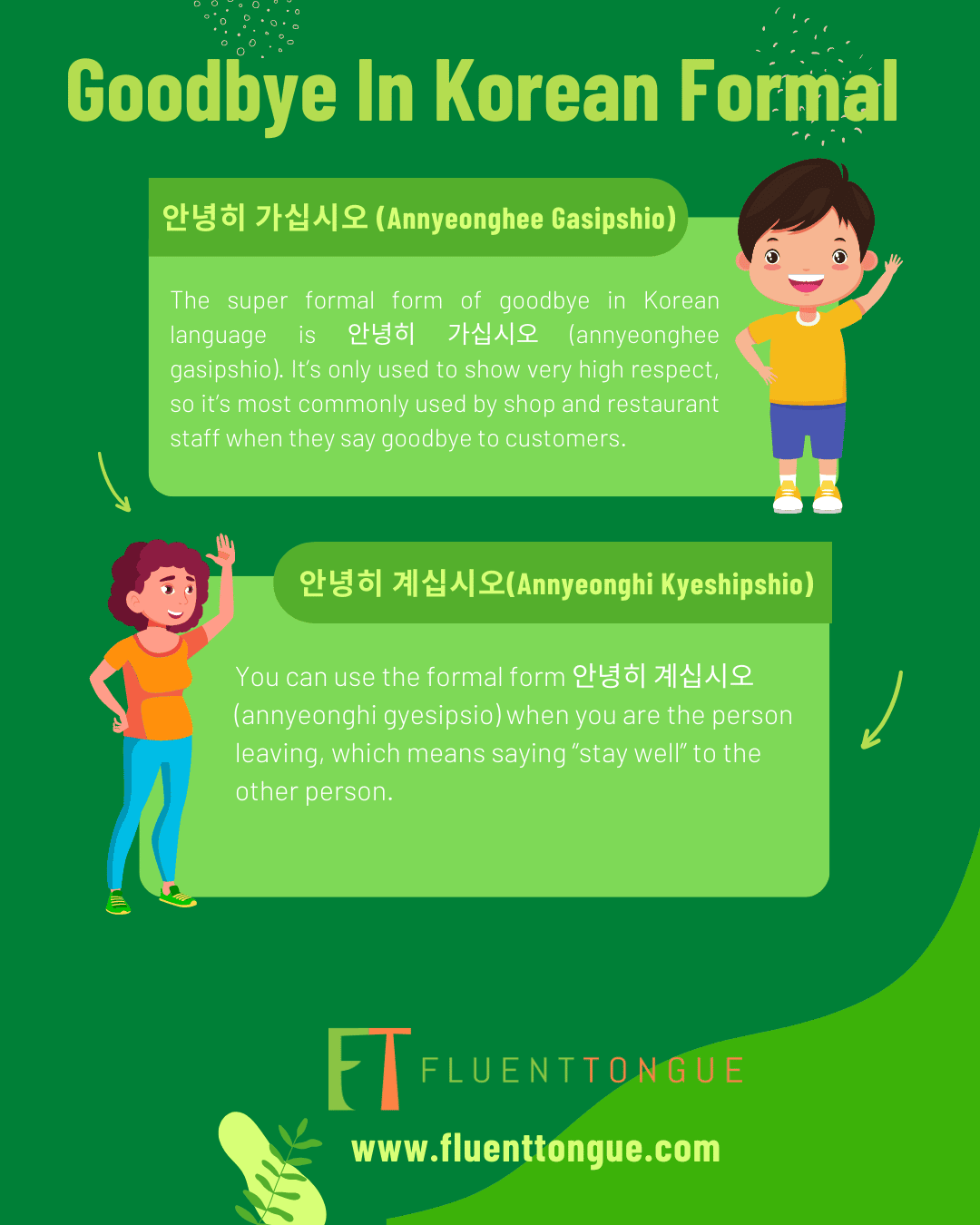
안녕히 가십시오 (annyeonghee gasipshio)
The super formal form of goodbye in Korean language is 안녕히 가십시오 (annyeonghee gasipshio).
It’s only used to show very high respect, so it’s most commonly used by shop and restaurant staff when they say goodbye to customers.
You’ll probably only hear them on TV, on the radio, or as you’re leaving a shop or restaurant and the staff is bidding you farewell.
안녕히 가십시오 (annyeonghi gasipsio) is the formal equivalent of 안녕히 가세요 and is used to wish someone “go well”,
Koreans don’t use them for daily life conversations.
안녕히 계십시오(annyeonghi kyeshipshio)
You can use the formal form 안녕히 계십시오 (annyeonghi gyesipsio) when you are the person leaving, which means saying “stay well” to the other person.
It is extremely formal. So Koreans don’t use them for daily life conversations.
10 advanced & alternative ways of saying goodbye in Korean.
Want to know alternative phrases for how to say goodbye in Korean in 10 different ways like a native?
Just scroll through the blog to learn the best 10 phrases you can use to say goodbye in Korean in a specific situation, which will help you sound like a native speaker.
조심히 가세요 – “Get Home Safe” in Korean
[조심히 가세요] is a set phrase that is used when saying goodbye in Korean, which is literally translated to “Get Home Safe”. It is a combination of [조심히] means ‘carefully’ and 가세요 is translated to ‘please go’ which is literally translated as‘ please go carefully (back home).
다음에 봐 (daeume bwa) -See you next time

The translation of this Korean phrase 다음에 봐 (daeume bwa) is “see you next time.” It is used when you are planning on seeing the person again but you are unsure of when.
다음에 (daeume) means “next time” in Korean, while 봐요 (bwayo) is the polite form of 보다 (Boda) which means “to see.”
So 다음에 봐요 means “see you next time.” In informal settings, you can say 다음에 봐 (daeume bwa).
If you want to respond when someone says to you,다음에 봐요, just say 다음에 또 봐요 (daeume ddo bwayo) or 또 봐요 (ddo bwayo). 또 (do) is translated as “again.”
내일 봐요 (naeil bwayo) – “See you tomorrow” in Korean

내일 봐요 (naeil bwayo) is translated as “See you tomorrow” in Korean where 나중에 (najunge) means “later.” You can use this phrase when you plan on seeing someone tomorrow.
To make the phrase informal, you just have to remove 요 (yo) and make it 나중에 봐 (najunge bwa). Remember to use this only with close friends!
나중에 봐요 (nachunge bwayo) – “See you later” in Korean
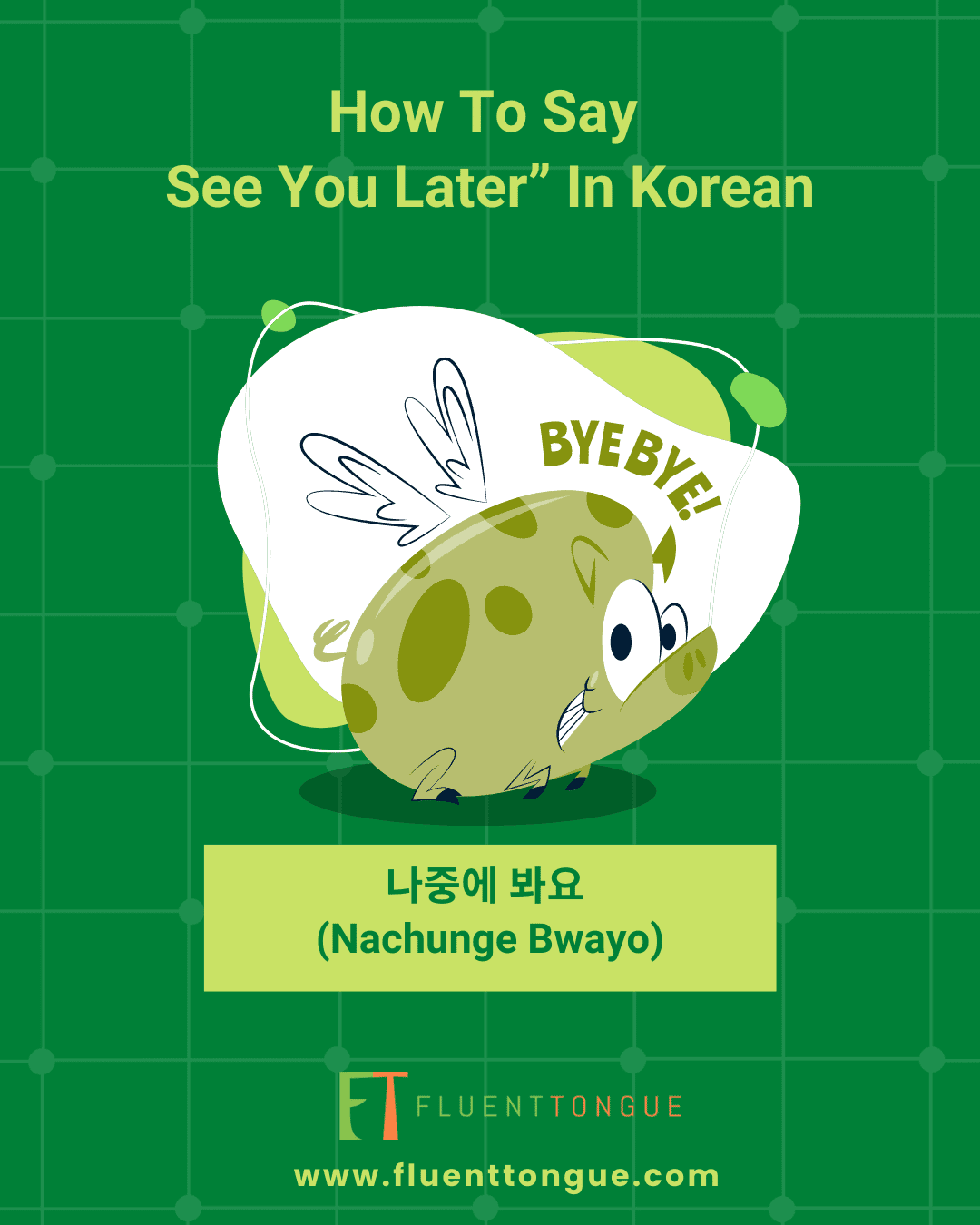
나중에 봐요 (nachunge bwayo) literally means “See you later” in Korean and 나중에 (najunge) means “later.”
It is another way to say goodbye in Korean when you are meeting someone later in the day. To make the phrase informal, you just have to say 나중에 봐 (najunge bwa).
Remember to use this only with close friends! ”
뿅 (bbyong) – “Bye” in Korean
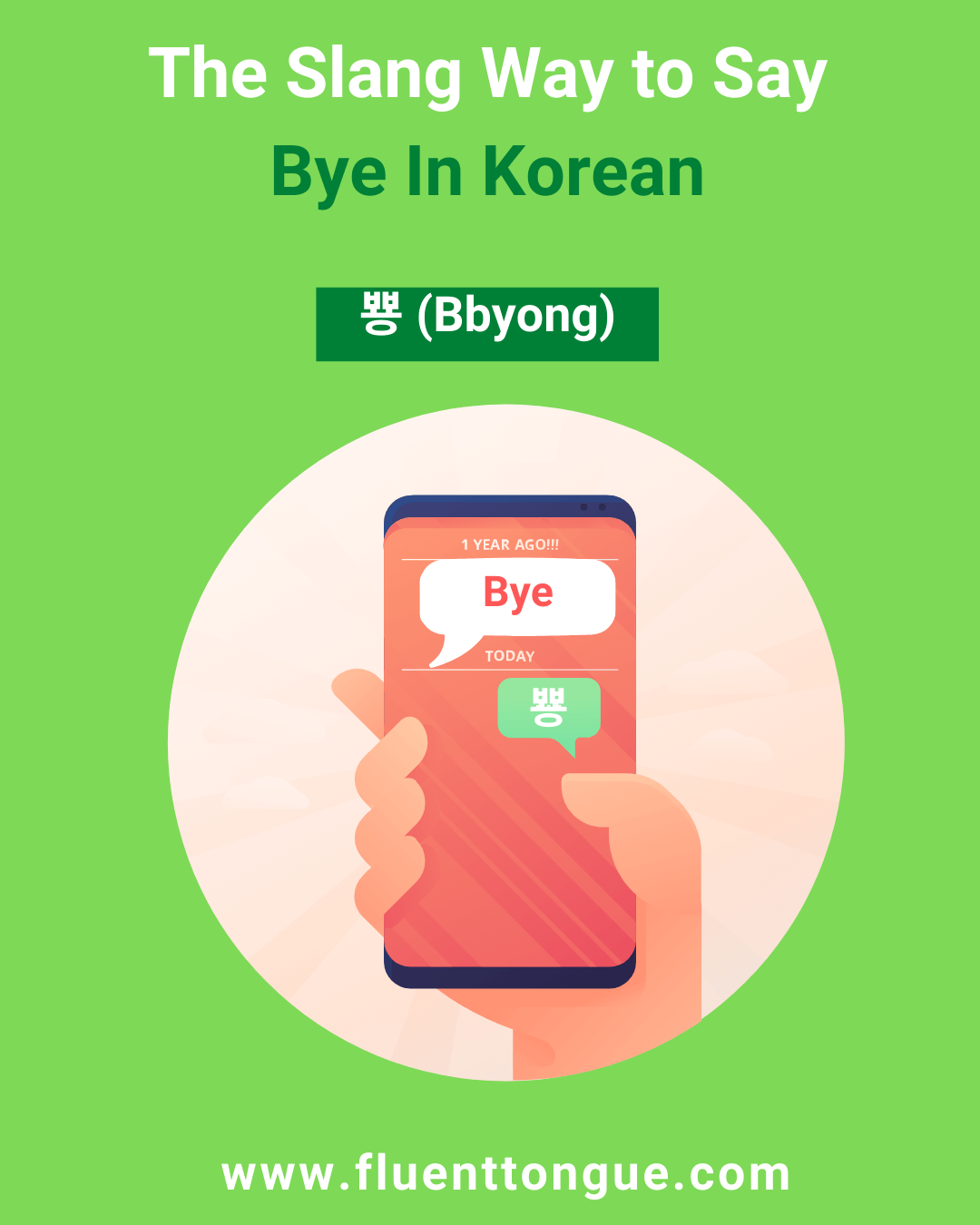
This is a slang expression for saying bye in Korean language.
It’s typically used in text speech when you feel like someone or something vanishing or disappearing.
잘 들어가 -‘enter well’
잘 들어가 (Jal deureoga) is literally translated as ‘enter well’ where the first word 잘 means “well” and the verb 들어가 which means ‘to enter’.
We use this expression when we know that the other person is going home, going back to work, or to school.
If you want to make it more formal and more respectful, just say 잘 들어가세요.
잘 가요 (jal gayo) – “Go well” in Korean
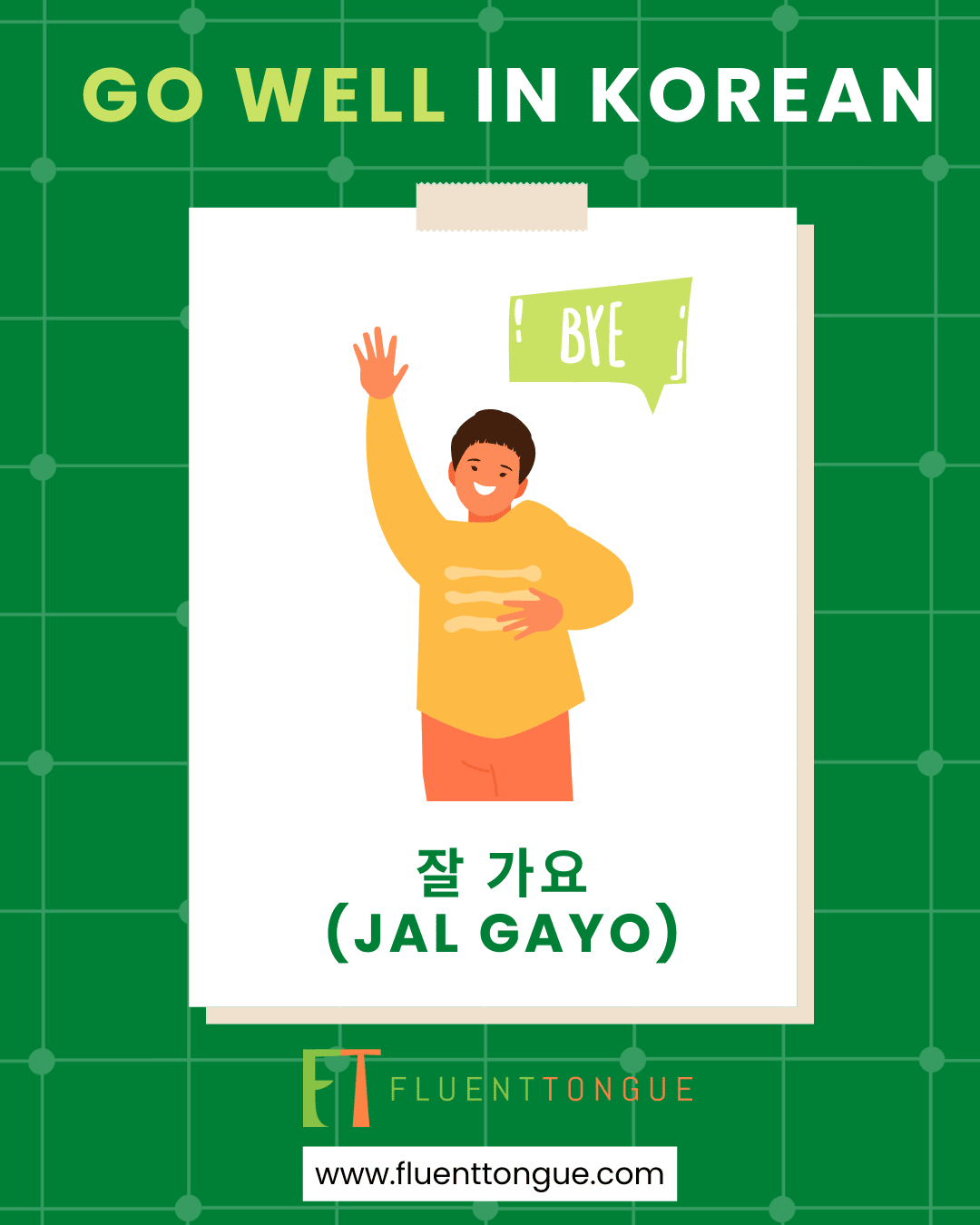
Another way of saying “goodbye” in Korean, if you are staying and the other person is leaving, is 잘 가요 (jal gayo). 잘 (jal) means “well” so 잘 가요 translates as “go well.”
You can say 잘 가 (jal ga) when talking to people you’re close with or people younger than you.
나 먼저 갈게 (na-meonjeo-gal-ge) – I will go first

The direct meaning of 나 먼저 갈게 (na-meonjeo-gal-ge) is “I will go first”.
It is a casual way of saying “goodbye” in Korean.
You might have heard this phrase on K-dramas or Korean variety shows for quite some time because it is a phrase that is frequently said in Korea.
To say it formally, just say 나 먼저 가요 (na meonjeo gayo).
잘 있어 (Jal-isseo)/잘 있어요 (jal isseoyo) – “Stay well” in Korean

잘 있어 (Jal-isseo)/잘 있어요 (jal isseoyo) means “stay well”. 잘, as we learned before, means ‘well’, and 있어 is the casual form of 있다 (idda), which means “to stay,”.
You can use this when we’re leaving a place and the other person is expected to stay.
However, just use the casual form ‘잘 있어’ with friends or close family members who are of similar age.
잘 지내 (jal jinae) is also an informal phrase to say bye in Korean and it translates to “stay well”.
Koreans only use this expression when they are not going to see the other person for quite some time.
건강하세요 (geongang haseyo) – “Take care” in Korean

You can say 건강하세요 (geongang haseyo) as you part ways, which literally translates as Take care” in Korean
조심히 가세요 (jo-shim-hi-ga-se-yo) – Leave safely or have a safe journey

조심히 가세요 (jo-shim-hi-ga-se-yo) is literally translated as “have a safe journey”. If you want to say it in a casual setting, just say the phrase 조심히 가 (joshimhi ga)
But if the person is going home, you can also say 조심히 들어가세요 (joshimhi deureogaseyo)
it is another way to say “goodbye” in Korean in a polite way if the other person is leaving where The adverb 조심히 (joshimhi) means “carefully”.
빠이 (ba-i) – Bye
빠이 (ba-i) – Bye is the Konglish (Korean + English) word for saying goodbye in Korean language and is pronounced as 빠이 (ba-i).
Remember, you can only use this with your close friends, siblings, or people younger than you
How to Say Goodbye in Korean at the End of a Phone Call?
The common expression for saying “goodbye” in Korean when ending a phone call is 끊을게요 (kkeunh eulgeyo) which literally means “I‘ll hang up.” If you want to say this in an informal way, you can use the expression 끊어 (kkun-heo).
For formal settings, like if you’re talking to your boss, use this phrase 끊겠습니다 (kkeunh gessseubnida).
But sometimes Korean also ends a phone call in Korean by saying 네~ (ne~), which means “yes. In Korean”.
you can use “네” both as a response or a question, depending on the context.
잘 자요 (Jal-ja-yo) – How to say Goodnight in Korean as goodbye?
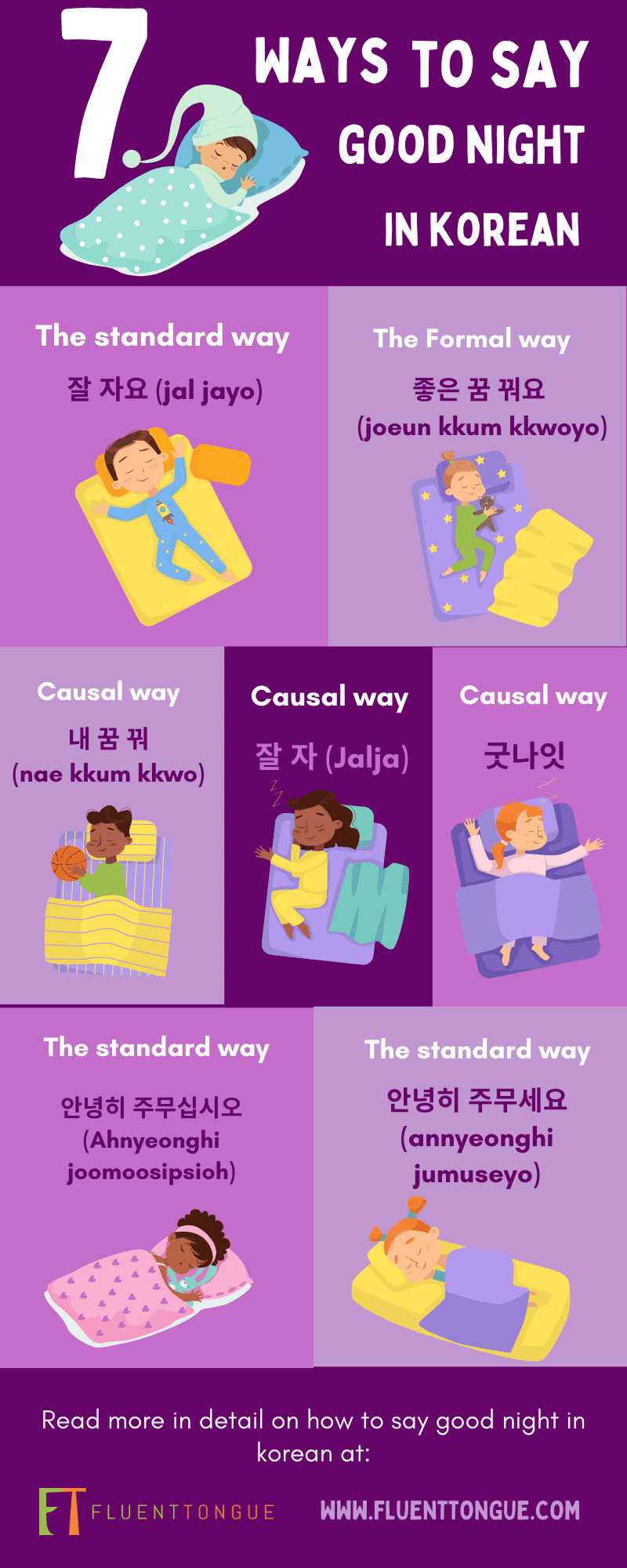
If you’re saying goodnight to someone at night, you can also say “good night in Korean.” instead of goodbye. The most common way of saying this 잘 자요 (Jal Jayo) but there are plenty of other ways to say it like
- 안녕히 주무십시오) (annyeonghi jumusipsio) – formal
- 안녕히 주무세요 (annyeonghi jumuseyo) – standard polite
- 편안한 밤 되세요 (pyeonanhan bam doeseyo) – formal
- 좋은 꿈 꿔요 (joeun kkum kkwoyo) – standard polite
- 잘자 (jalja) – informal
- 굿나잇 (gun nait) – informal, Konglish
- 굿밤 (gut bam) – informal, slang. 밤 (bam) means “night” in Korean.
CONCLUSION
Great job. You finally know how to say goodbye in Korean.
You have learned the different ways to say bye in Korean, and the particular scenarios that they are used for, so you will be able to confidently wish someone a farewell.
However, It can be hard to remember which phrase to say and when to use it, but as long as you understand that 잘 가 (Jal-ga) is only used when someone is a friend of yours/younger than you and Polite – 안녕히 가세요 (annyeonghee gaseyo) and 안녕히 계세요 (annyeonghee geseyo) with elders, teachers, boss or people older than you, you shouldn’t have any problems.
All these words are widely used and accepted in Korea.
So go out and next time you meet a Korean speaker! be sure to say bye when needed
Want to test yourself after reading the article below? These online exercises will help you out.
https://quizlet.com/544229247/8-ways-to-say-goodbye-in-Korean-flash-cards/
https://quizlet.com/298989262/saying-goodbye-Korean-unnie-flash-cards/
https://quizlet.com/356024573/ways-to-say-bye-in-Korean-flash-cards/
Looking for more about common greetings in Korean? Here is a list of articles about them.
Here are some recommended lessons you can start with.
That’s it for today’s lesson. I hope you enjoyed it. we will see you next time. 안녕!
